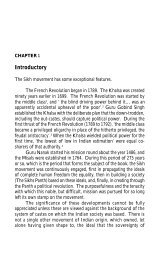Debate on Dasam Granth; Issues and Evidence - Global Sikh Studies
Debate on Dasam Granth; Issues and Evidence - Global Sikh Studies
Debate on Dasam Granth; Issues and Evidence - Global Sikh Studies
Create successful ePaper yourself
Turn your PDF publications into a flip-book with our unique Google optimized e-Paper software.
for divisi<strong>on</strong> am<strong>on</strong>g the <strong>Sikh</strong>s <strong>and</strong> diffuse the unique <strong>Sikh</strong> ideology enshrined in Sri<br />
Guru <strong>Granth</strong> Sahib.<br />
In c<strong>on</strong>clusi<strong>on</strong>, presently <strong>Dasam</strong> <strong>Granth</strong> is a piece of <strong>Sikh</strong> literature like many other books in <strong>Sikh</strong><br />
history which does c<strong>on</strong>tain Nit Nem compositi<strong>on</strong> of <strong>Sikh</strong>s as sancti<strong>on</strong>ed In <strong>Sikh</strong> Rahat Mardaya.<br />
Tenth guru gave no sanctificati<strong>on</strong> to any <strong>Granth</strong> other than the S.G.G.S. Presently published<br />
<strong>Dasam</strong> <strong>Granth</strong> available since 1897 is a heterogeneous <strong>Granth</strong> compiled in late 18th century by<br />
Mahant Nawal & Dayal Singh <strong>and</strong> Sukha Singh <strong>Granth</strong>i at Patna by transliterating a Hindoove<br />
language manuscript “Nanak Panthi Kabya” to Gurmukhi <strong>Granth</strong>, “Dasmi Patshahi Ka <strong>Granth</strong>”<br />
(presently located in BL L<strong>on</strong>d<strong>on</strong> Cataloged as MSS D5 Punlabi). They Interpolated Bani <strong>and</strong><br />
some writings of Patshahi 10 <strong>and</strong> other similar Saloks popular in SGGS ( Gutkas or oral<br />
remembrance of <strong>Sikh</strong> families) into this heterogeneous <strong>Granth</strong> inorder to gain credibility of this<br />
<strong>Granth</strong>. This <strong>Granth</strong> was promoted by Malcolm initially in “Sketch of the <strong>Sikh</strong>s” <strong>and</strong> was<br />
brought to Punjab Gurdwaras by Nirmalas <strong>and</strong> Shahid Taksals in early 19th Century. This fact<br />
can be easily understood <strong>and</strong> deduced from the summary of Malcolm’s account given in his book<br />
(1810,1812AD).<br />
“The tribes of Acalis (immortals) who have now assumed a dictatorial sway in all the religious<br />
cerem<strong>on</strong>ies at Amritsar, <strong>and</strong> Nirmala <strong>and</strong> Shahid, who read the sacred writings, may<br />
hereafter introduce some changes in those usages which the <strong>Sikh</strong>s revere: but it is probable<br />
that the spirit of equality, which has been hitherto c<strong>on</strong>sidered as the vital principal of the<br />
Khalsa or comm<strong>on</strong>wealth, <strong>and</strong> which makes all <strong>Sikh</strong>s so reluctant to own either a temporal<br />
or spiritual leader will tend greatly to preserve their instituti<strong>on</strong>s from invasi<strong>on</strong>; <strong>and</strong> it is<br />
stated in a traditi<strong>on</strong> which is universally believed by the <strong>Sikh</strong>s, <strong>and</strong> has, indeed been inserted in<br />
their sacred writings, that Guru Gobind Singh when he was asked by his followers, who<br />
surrounded his death bed, to whom he would leave the authority? Replied, I have delivered<br />
over the Khalsa (comm<strong>on</strong>wealth) to God, who never dies. I have been your guide; <strong>and</strong> will still<br />
53
















